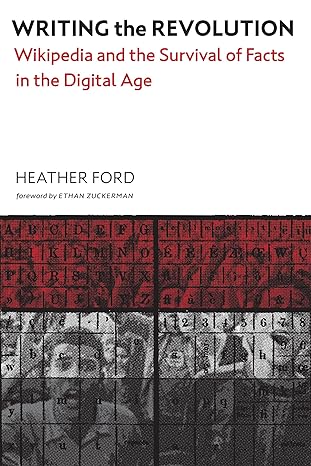The Book
Writing the Revolution: Wikipedia and the Survival of Facts in the Digital Age
The Author(s)
Heather Ford

Wikipedia first emerged over two decades ago in 2001 as the brainchild of co-founders Jimmy Wales and Larry Sanger. It was an attempt to create an online encyclopaedia accessible and editable by all and has since become one of the most ubiquitous and controversial entities in recent history. Its Creative Commons license means that the content of Wikipedia is free for anyone to edit, copy and share, so long as they attribute Wikipedia and apply the same conditions to the new material.
Wikipedia is now regularly cited as one of the top ten most popular websites in the world, yet has also faced government censorship and criticism over its reliability and potential bias. After twenty years it is now considered old enough to have its own history and is often used as a modern bookend by historians of the encyclopaedia, those studying the history of knowledge, and, more recently, of truth, fake news and misinformation. Historians from Peter Burke to Roy Rosenzweig have considered the role of Wikipedia in how history is created, disseminated and preserved.
This most recent book by Heather Ford explores takes a slightly different emphasis by exploring how Wikipedia can influence how we perceive and interpret current events, and the impact that can have on how those events play out (and indeed their longer term consequences). Based on a ten year study, she focuses her argument around one specific snapshot of time; the Wikipedia article written about the Egyptian uprisings of early 2011. This is a significant choice of event in itself, given that it has been positioned as the first major event where social media platforms enabled social and political dissent. Ford argues that the Wikipedia article on this event transferred the uprisings from “protests” to “revolutions” which became accepted truth. Using the Egyptian case study, she explores how Wikipedia shaped opinion in real time to ultimately “co-construct” the event, rather than simply reflect it back through consensus views and multiple editors.
This is significant, argues Ford, because there remain significant gaps in our understanding of the partiality and bias of Wikipedia. The ‘mirror theory’ posits that Wikipedia is simply reflecting back the partiality of the world; that inequities of representation of its topics mirror inequities in real life. Of course, this theory positions Wikipedia as a passive observer of the world when, as Ford argues, it is actually very dynamic in shaping opinion.
In the aftermath of historically significant events, there is often an increased demand for information by the public to make sense of what happened (or is happening). Ford discusses how what she calls knowledge agents, such as Wikipedia, construct factual claims which are shaped by the authors and editors of the website, and then wrapped in metadata to allow the algorithms of internet search engines to pick up on these facts and share them around the world as truth. Ford’s interest is less in any apparent bias in Wikipedia articles and more in how “Wikipedia is shaped by, and in turn shapes the world”. Despite its status as an encyclopaedia, Ford suggests that Wikipedia has now transcended this and has become, like Google, what she calls a “critical knowledge infrastructure”. Wikipedia appears authoritative because it appears to reflect the consensus truth about the world, but, asks Ford throughout this book, how is this consensus truth reached? Does Wikipedia represent a people’s history, or do certain groups dominate these truths or representations? Or, she asks rather bleakly, is history now written by algorithm?
As historians, we know that events have multiple meanings, multiple truths, depending on the perspective of the narrator. But in an age of instantaneous recording of events there can be multiple actors documenting events as they happen, leading to a struggle for the authoritative first draft of history. Algorithms can be highly influential in shaping which facts are shared on digital platforms, which in turn can influence the meaning of events. Wikipedia may be transparent in sharing the editing history of its pages, but this record does not give us any information about the processes of how decisions were made about what to edit and when. Ford suggests that knowledge platforms such as Wikipedia need to offer contextual traces of these decisions, to situate the facts within their subjective environment. Instead of simply asking “what happened?” on a certain date or place, she argues we need to be able to ask “how can you be certain?” The digital world can be celebrated for its democratisation of knowledge, of allowing more people than ever access to information about events – and for Wikipedia this access is free and global – but there are real dangers with how that knowledge is presented. Ford argues that the answer is to provide automated systems a way of situating knowledge, to give context to the facts collated by the algorithms and collective data. Ironically, this is what historians have always done and been trained to do. The most significant take away from this extremely relevant and powerful book is that we need to have a better understanding about how such monolithic and permeating knowledge structures such as Wikipedia shape both events and our understanding of them, and how this ultimately impacts the historical record.
About the Reviewer
Toni Weller was educated at Cambridge University and City, University of London. For almost two decades her research has focused on the history of information, and she has also published and lectured on the history of surveillance and the role of history in the digital age. She sits on several editorial boards and is a former editor of the journal Library & Information History.
Dr. Toni Weller, De Montfort University, UK [email protected]

0